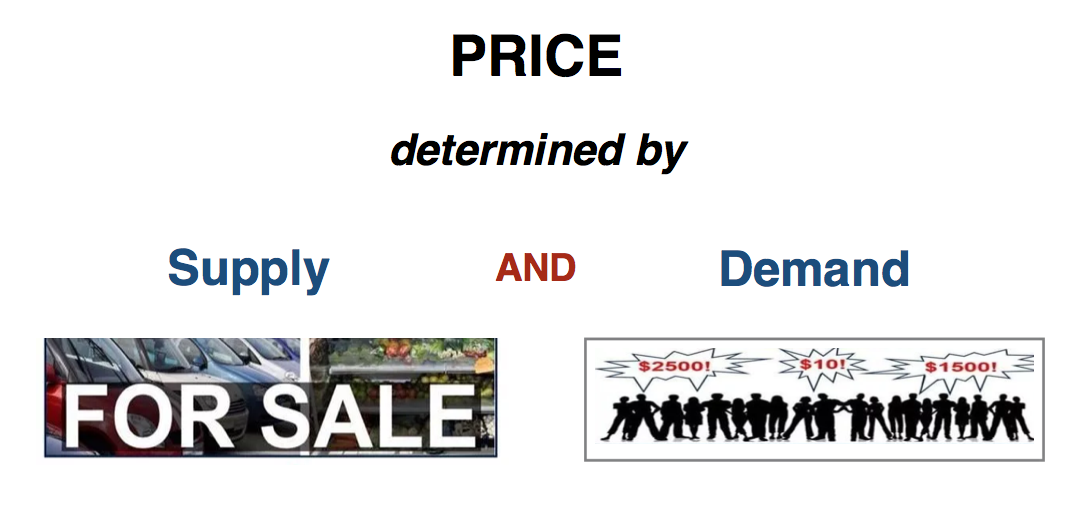The Price of something is how much you paid for it or how much it is on sale for. Put simply, it is how much the seller will accept for the sale of a product or service.
Today, we express prices in units of local currency, such as dollars in the US or pounds in the UK.
We express commodity prices as currency per unit weight of that commodity, for example, dollars per ounce.
Less often we quote prices in quantities of other products or services. However, this type of barter exchange is extremely rare these days. We also quote some prices in a customer voucher reward system, such as air miles or trading stamps.
The digital marketplace has introduced new pricing models, such as subscription-based pricing, where prices are set for ongoing access to a product or service rather than a single purchase.
In many prisons and in times of hyperinflation people quote prices in units of a product such as cigarettes. The same may also occur in a black market economy.
The Cambridge Dictionary has the following definitions of ‘price’:
“1. (Noun) The amount of money for which something is sold. 2.(Noun) The unpleasant results that you must accept or experience for getting or doing something. 3. (Verb) To decide the price of a particular product or service. 4. (Verb) To put a ticket or label on goods in a store to show how much they cost.”

Price vs. cost
Prices and costs are not the same. Cost is the expense a commercial entity incurs in creating a product or service. Price, on the other hand, is how much the consumer pays for that good or service.
What is the difference between the cost of making something or buying it and the price you sell it for? It is the markup or margin. We call a margin of 100% a keystone markup.
Imagine you are a customer and pay $25 dollars for an item that cost a firm $10 to produce and sell. That product ha a $15 markup.
Pricing loans and derivatives
In a number of financial transactions, it is common to quote prices in specific ways.
When pricing a loan, for example, we express the cost as the percentage rate of interest. How much interest borrowers must pay depends on their creditworthiness and the loan amount. It also depends on the duration of the loan.
The price of inflation-linked government securities in most countries is quoted as its actual price divided by a factor representing inflation since it was first issued.
Other meanings of price
The word has many meanings both in and outside the world of business and finance.
- A wanted criminal: when we say “The criminal had a price on his head,” we are talking about a sum of money. Specifically, a reward for catching him and delivering him to the authorities.
- Bribing people: we sometimes use the term when referring to the point corrupting people, as in “Every person has a price.”
- Sacrifice: we use the word when we can only overcome a challenge with considerable sacrifice. For example: “They were eventually victorious, but at a considerable price.”
- Basic Price: this is the price a vendor gets after deducting all taxes paid by a buyer and adding any subsidy the seller receives for selling.
- Producer Price: this is how much the producer receives from a buyer for a unit of a product or service produced as output minus any tax. It does not include any transport charges the producer may invoice separately.
The verb ‘to price’
As a verb, the term may mean:
- To discover how much things are selling for. For example: “We went around all the dealers pricing different minivans.”
- To establish how much people will have to pay for something you are selling. For example: “We have priced our new smartphone at $500.”
- We may also use the verb to explain why a product failed to succeed in a competitive market. For example: “He priced himself out of the market.”
Fixed vs. flexible pricing
Some businesses allow buyers and sellers to negotiate the final price of a product or service. Those companies have a flexible pricing approach.
If a company does not negotiate prices, it uses a fixed pricing system.
Zone pricing
Companies that have a zone pricing system charge different amounts depending on where the customer is.
Usually, the price depends on how much it costs to ship the goods to the customer.
The United States for example, may have four price zones. The most expensive one is furthest away from the seller’s manufacturing plant.
